The “Art” of Re-homing an Equine
Guest blog by lifelong equestrian, Bonnie Ebsen-Jackson
One of the most painful things I’ve ever had to do was re-home a beloved horse that I had spent years training and riding, one I was mentally, emotionally, and financially invested in. I tend to give my horses “forever homes” when they come to live with me and the handful of times I couldn’t do that were heart-wrenching. I was reminded of those circumstances when I got the following email recently.
“Hi Bonnie,
I really hope you can give me some helpful advice on my very sad situation. I’d value any insight you have for me. I have to go to school full time next semester and won’t have the time or money to keep my horse, so I need to sell her. Here’s the really sad part—after years of struggling with her, I’ve finally got her to where she’s fully trained, and great fun to ride. Now that she’s the perfect horse and I have to let her go! Everyone says the ‘market stinks’ right now, so I know I won’t get a good price for her, especially since she’s not papered. I’m heartsick about this. What advice do you have?
–M.S.”
 First of all, it’s awful to be in that position—having to choose between furthering your education and keeping your animal. She has my sympathy, indeed. No doubt, the feelings she is having are intensified by those wonderful memories of overcoming her mare’s problems and the years they spent developing a good equine partnership. That said, things might not be as grim as they seem. We just need to think “outside the box” for a bit. In every situation, there can be hidden benefits and happy solutions.
First of all, it’s awful to be in that position—having to choose between furthering your education and keeping your animal. She has my sympathy, indeed. No doubt, the feelings she is having are intensified by those wonderful memories of overcoming her mare’s problems and the years they spent developing a good equine partnership. That said, things might not be as grim as they seem. We just need to think “outside the box” for a bit. In every situation, there can be hidden benefits and happy solutions.
So, what are M.S.’s options? First let’s look at the most dreaded—selling her horse outright. Having spent much time
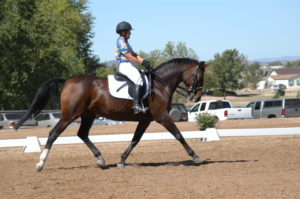
Show proper riding gear
over the years, researching the market for suitable mounts for my students and myself, I’ll share some dos and don’ts for marketing an equine.
- Commit to the Plan
Be sure you’re committed in your heart and mind to selling her. Nothing is more frustrating for a buyer, and self-sabotaging for an owner, than to be undecided about selling their horse. This half-heartedness will show up as vague or misleading ad copy and photos that don’t really show your horse well—or at all! For instance, I have seen ads where the seller posted shots of their horse, at dusk, eating out of a feed trough, with a fly mask on. That…tells…us…nothing, except that the horse eats and has fly protection.
- Get Some Experienced Feedback
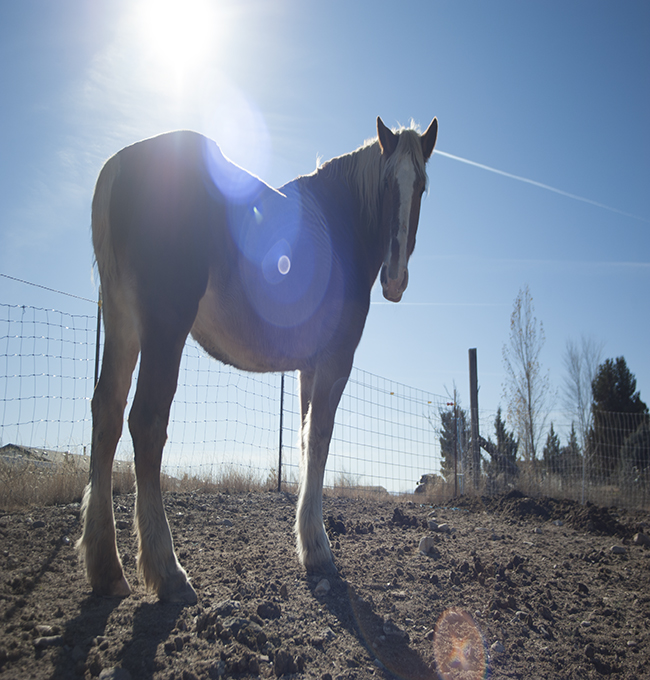
Do not shoot horses from poor angles with sun glare
Before placing a sales ad, I suggest you get opinions from knowledgeable horse people—preferably those with no financial interest in your mare—on pricing and range of rider suitability. These are the two things that a horse owner can have trouble being objective about. The former is due to all the money you’ve put into your horse over the years, including her initial purchase price. A lot of this expense must be viewed as the cost of enjoying your hobby and can’t be recouped in her sales price, unless she’s a champion in some competitive field and at the top of her game. The latter issue—deciding rider suitability happens because of propinquity, or, your familiarity with the horse: Your horse is calmest, most comfortable, most obedient, and most responsive to you as her rider. How she performs for someone who comes to try her out, or in a new setting may be an entirely different and eye-opening experience. That is why you need to have some savvy equestrians ride her first and give you their opinion whether she’s good for a beginner/intermediate rider or whether she should be marketed as advanced only.
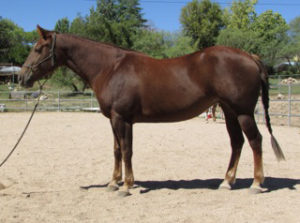
Courtesy Photo-Conformation shot
- Research the Current Market
Do some research on Internet sites like Dreamhorse.com and Equine.com, as well as any classifieds or websites of
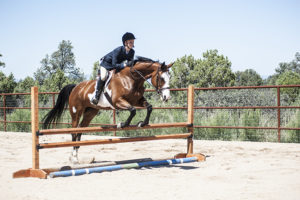
Show Horse performing action
local horse papers in your area. Look at several horses that seem have your animal’s credentials and qualities, and you’ll soon start to see a “ballpark figure” they all have in common. You’ll also notice the hopelessly overpriced or suspiciously under-priced. You may start to notice certain stock phrases that mask flaws and failings, for instance, “Loves to go!” (but can he stop?) “dead broke” (or just injured or half dead?) or “bomb proof” (wait, let me get my detonator and test this). Avoid using those terms in your ad. One of my favorite lines is “Anyone can ride–best suited for endurance.” Endurance is a racing event requiring a horse with a lot of athletic drive. If that is what the horse is best suited for, it may not be a good mount for just “anyone.”
- Take Good Quality, Honest Photos
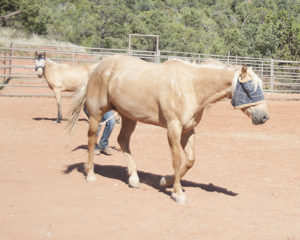
Do not photograph with a fly mask on!
Be prepared with photos, preferably in the initial ad, but at least to send to those who inquire about the horse. Using a digital camera, do take well-lit conformation shots, both with and without a saddle (in both English and Western tack if she does both). Does she ride bareback, and would you trust a neighborhood kid on her back? Take a shot of that. Your farrier says she has awesome hooves? Take a close-up of her feet. Avoid “artsy” shots and aim for accurate depictions of your horse that show off her greatest assets. I recently saw a photo ad for a rope horse, taken by moonlight, showing only his head and shoulders, with an asking price of $5000. There was nothing in that ad that would have compelled me to drive the two hours from my home to Phoenix in the summertime to see that horse. If the photos don’t make a buyer want to come see your horse, then don’t waste time taking or posting them. Do upload a short video of you or a skilled equestrian (or a novice if she is good for beginners) riding your mare to Youtube.com and post that link. Successful horse marketing is mostly electronic these days and you stand a better chance of successfully “re-homing” your beloved equine if you learn to use that medium to the fullest extent. Before you launch an electronic ad or post, send it off to the same knowledgeable friends and ask if your words and images “tell the story.”
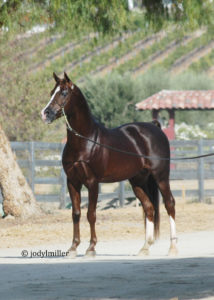
Hire a professional horse photographer- Conformation shot
- Explore Alternatives to Outright Selling
What about leasing? Is there a possibility of finding your horse a temporary home while still maintaining ownership (and control) over her? Yes, but do so carefully. What is called a full or half feed lease can be a blessing or disaster, depending on how attentive you are to the details. In today’s economy, there are still many people wanting to get into horses without a large startup expense. These people often have pre-teenagers, who are horse-smitten and willing to do a lot of work to provide for a horse. Leases can relieve a financially strapped horse owner from financial burden, either temporarily or permanently, depending on how the match works out. If you board your horse at a commercial stable that gives riding lessons, see if the instructor will refer you to some of their students’ parents. Leasing a horse at the facility where their child already spends much of his or her waking hours can be a good introduction to horse ownership for parents. The benefit for you is more assurance that your beloved horse is being cared for up to your standards.
- Make Sure You Have Proper Wording in Your Paperwork
There are many horror stories out there regarding horse ownership disputes. If you are selling, make up a bill of sale with the horse description on it and include any provisions, such as a buy-back clause. This becomes even more critical in a lease situation. If you are to remain the horse’s owner, you will need to protect your interests in writing. It is extremely important for you and the potential lessee to have a signed and notarized document spelling out the conditions of the lease and who is responsible for what aspect (feed & supplements, housing, farrier, veterinary) of the horse’s care. For a more information on drawing up lease and sales agreements, go to http://www.equine.com/help/legal.aspx
A lifelong equestrian, Bonnie Ebsen-Jackson runs equine-assisted learning and therapy (EAL/EAP) groups at her T.H.E. Ranch in Skull Valley, where she also teaches riding and natural horsemanship. Bonnie is the author of Herdmates to Heartmates: The Art of Bonding with a New Horse . If you would like to learn more about her coaching service for horse owners, you can contact her at (928) 899-5088 or by email at bonnie@t-h-e-ranch.com or through her FaceBook page at New Horse Owners Rx.
Jody Miller is a professional photographer specializing in Horse Photography, Equine Photography, and Equestrian photography. Jody is available for hire for private equine photo shoots. Her work can be viewed online here in her gallery section, and she is also featured at Arts Prescott Gallery, in Arizona.
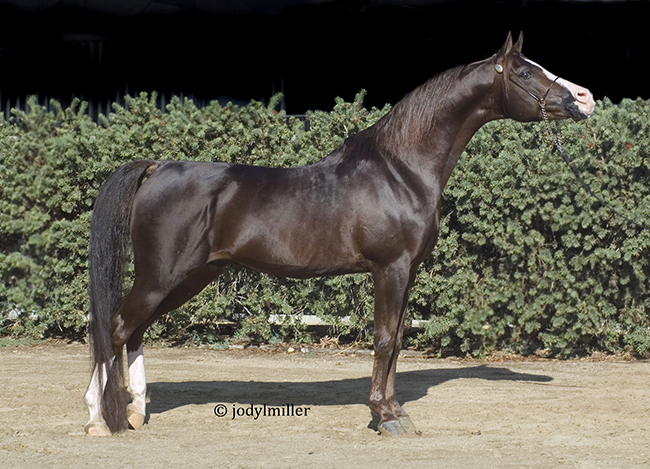
Comments
Thoughtful and insightful as ever, Bonnie (and Jody, your photographs are splendid). I’d like to add that your young owner might also want to consider the outright gift of her mare to an appropriate older person who can offer her experienced care and a forever home. I’ll always be grateful to the young woman who turned her gorgeous Arabian gelding over to me to partner with and bring into my equine family here on the ranch. I know it broke her heart to let him go, but she has the satisfaction of knowing she did the right thing for all three of us; Mica has his freedom and his new friends, and I have the mount of a lifetime!
Thanks Allena- We are so happy you and Mica are such a good match.
Pingback: Horse Photographer vs Horse Photography on Google - Jody L Miller Photography